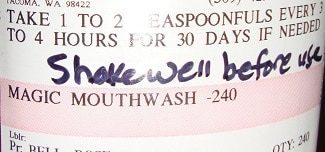How Much Does Magic Mouthwash Cost?
Last Updated on November 26, 2023
Written by CPA Alec Pow | Content Reviewed by ![]() CFA Alexander Popinker
CFA Alexander Popinker
Mouth sores can make eating, drinking, and even talking extremely painful. Cancer patients undergoing chemotherapy or radiation often develop these uncomfortable mouth ulcers, known medically as “oral mucositis.” Other conditions like viral infections and illnesses impacting immunity can also spark mouth lesions.
To relieve soreness, doctors sometimes prescribe what’s informally called “magic mouthwash” – a mixture of different liquid medications swished around the mouth. What exactly is this oral rinse though, does it work, and how much does obtaining it cost?
How Much Does Magic Mouthwash Cost?
The combination of multiple medications, special pharmacist compounding fees, and lack of insurance coverage for experimental items leads to high price tags for most magic mouthwash prescriptions.
Out-of-pocket costs often land between $50 to $100 per bottle. Usually, only a small 5 to 10-day supply gets mixed at once to prevent stability issues. So the costs can add up quickly for long-term use.
For patients already dealing with medical bills, such constant costs for questionable extra relief feel understandably frustrating. However, a few ways to curb magic mouthwash costs include:
- Asking your insurer about exceptions or appeals to have more covered
- Splitting one larger bottle with the same prescriptions among family members
- Trying less expensive salt water rinses first instead
You might also like our articles about the cost of a cortisone shot, a dental cleaning, and a well-baby doctor visit.
What is Magic Mouthwash?
Magic mouthwash goes by the clinical name “compounded oral rinse.” As the name suggests, it’s a special blend of various over-the-counter and prescription drugs that get combined by a pharmacy into one liquid cocktail. Common ingredients include:
- Lidocaine – A numbing agent to dull mouth pain nerves
- Diphenhydramine – The antihistamine in medications like Benylin to reduce swelling
- Antacids – Help medication adhere to sores
- Antibiotics or antifungals – Prevent additional infections
Most magic mouthwash solutions don’t have alcohol in their composition.
This blend of drugs aims to temporarily relieve pain from irritating mouth ulcers. The ingredient mix is tailored to each patient’s specific symptoms and needs.
One member of the Cancer.org forum, for instance, talked about having to pay $69, however after insurance coverage, this was lowered to $2. The same discussion had a member say that they paid even more, about $79 for their prescription.
The CancerCompass website also had a discussion where someone said they were quoted $60 a bottle with a prescription, while someone else was only quoted about $30.
 If you’re going for a non-prescription mouthwash instead, you will get similar results as with the prescription mouthwash, although the prices will be considerably lower, anywhere from $11 to $22 per eight-ounce bottle.
If you’re going for a non-prescription mouthwash instead, you will get similar results as with the prescription mouthwash, although the prices will be considerably lower, anywhere from $11 to $22 per eight-ounce bottle.
This will likely depend on the brand you’re going for and the place you buy it from.
Still, most of the active ingredients recommended for mouthwash won’t be found in non-prescription mouthwash. This means that it is unlikely to work for your particular issue or condition.
According to a study done by the American Academy of Nursing, which looked into the costs of different types of magic mouthwash brands that are currently available on the market, You will likely spend anywhere between $35 and $60 on the usual eight-ounce package.
You will probably use it 4 to 6 times per day and your usual prescription for mouthwash will last 2 days or less, which means that you should be prepared to spend roughly $18 per day on this type of mouthwash.
WebMD states that Magic mouthwash usually costs $34 to $50 for 8 ounces.
Red Apple Pharmacy sells magic mouthwash for $39.99.
Prevention Health Sciences offers a 16oz Prevention Oncology Mouthwash, Non-Alcohol, for $24.99.
Magic mouthwash compound overview
You will find quite a few different magic mouthwash brands on the market, according to the Mayo Clinic. Some of them are “ready to buy” from a pharmacist, while others can be found in a pre-measured package that will have to be blended by a pharmacist.
Magic mouthwash side effects
- a burning/tingling sensation,
- sleepiness,
- constipation,
- queasiness,
- diarrhea
Does Magic Mouthwash Actually Help Mouth Sores?
A few studies have researched the effectiveness of magic mouthwash in diminishing mouth sore distress. Unfortunately, evidence remains limited and somewhat conflicting so far regarding any benefits over and above simpler salt water rinses.
Some patients do gain relief from compounded mouthwashes, but not necessarily because of anything “magical.” The numbing impact of lidocaine seems to help the most. However, the other additives show little additional benefit based on analysis thus far. More widespread effectiveness research is still needed.
Are There Alternatives?
Before pursuing pricey magic mouthwash options, consider simpler pain relief ideas with your doctor or dentist. Good options include:
Salt Water or Sodium Bicarbonate Rinses
- Mixing a basic salt rinse at home costs almost nothing
- Studies show it helps as much as medicated rinses
- Baking soda boosts soothing effects
Oral Gel & Cream Treatments
- Gels like liposome encapsulated vitamin E require fewer applications than rinses
- Special coatings protect lesions between doses
- Often affordable OTC
Anbesol, Orajel, & Other Numbing Treatments
- Already combined topical analgesics reduce mixing fees
- Direct contact gives rapid targeted relief
- Available as gels or rinses
Final Words
Ask your medical providers if trying any of these simpler, cheaper sore mouth therapies makes sense before pursuing specialty mixed compounded magic mouthwash formulations.


Leave a Reply
Want to join the discussion?Feel free to contribute!